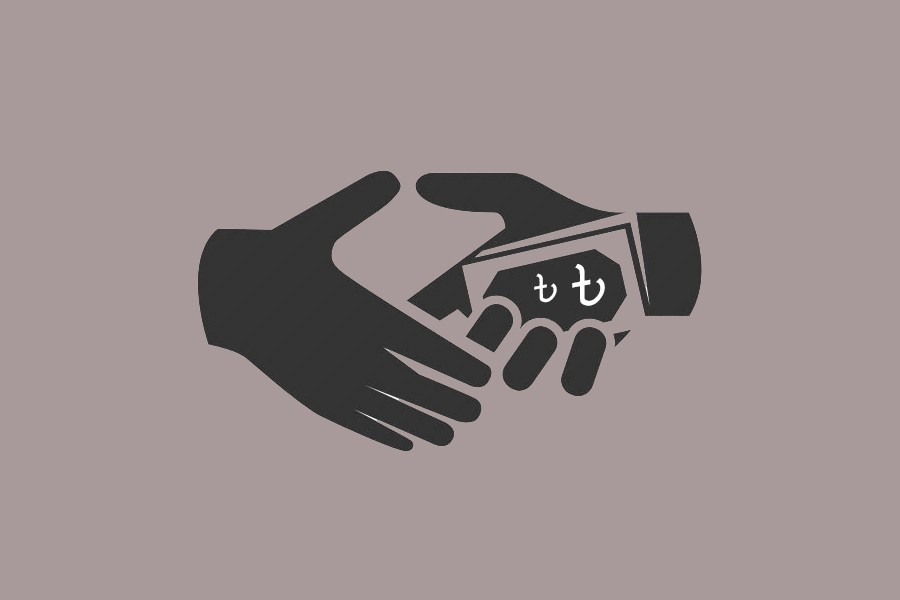The latest ranking of Bangladesh in the global Corruption Perception Index (CPI) prepared by Berlin-based anti-corruption watchdog Transparency International (TI) has dropped during 2019-20. According to the latest CPI report, Bangladesh's global ranking has slid to 12th from bottom among 180 countries from the earlier 14th in 2018-19. Looking at the list from the top, Bangladesh's position remained unchanged at 146th, which it shared with Central African Republic and Uzbekistan. Regrettably, Bangladesh could garner only 26 points out of maximum possible 100 in the index, with the score remaining same during the previous two years. But ominously, the score is only better than Afghanistan (19 points) in South Asia, and fourth among the worst in the Asia-Pacific region.
Corruption has its roots deep inside the socio-economy of Bangladesh. The general masses routinely fall prey to corruption in different shapes and forms. It not only hampers economic growth, local and foreign investments are also discouraged in the process. The availability of resources decline, poverty rises and efforts for human development are jeopardised as a result. If Bangladesh could reduce its corruption levels to those of the least corrupt countries of the world, then it could add between 2.1% to 2.9% to its per capita annual GDP growth (World Bank, 2000).
Corruption in Bangladesh emanates from both political and administrative arenas. In most cases, it takes place in the form of bribery. Besides, misuse of power, nepotism, fraud, embezzlement and patron-client relationships also give rise to corruption. If the political process becomes corrupt, then naturally, administrative corruption also increases. Development efforts are therefore seriously hampered due to the spiralling rise of corruption in all corners of bureaucracy and politics. The future potential and viability of the state are also threatened as a result.
Today, corruption appears to be pervasive in all sectors of the country including education and healthcare. The ethical values, sense of justice and fair-play appear to have gradually waned due to an apparently rising tide of corruption in society. Forgetting the need for achieving professional excellence, people working in various areas appear to be engaged in a fierce rat-race for accumulating wealth and unearned incomes by any means. This preponderance of rent-seeking activities has given rise to a corporate culture of corruption throughout the land. The CPI index attempts to measure the pervasiveness of corruption globally based on the perceptions of businessmen, investors, researchers and analysts. The scores are tabulated on a scale from 0 (most corrupt) to 100 (least corrupt). The countries are ranked on the basis of weighted average scores in this scale. The definition of corruption used for the measurement is 'abuse of public office for private gain'. This year, the surveys used for determining the CPI status were: Country Policy and Institutional Assessment of the World Bank; Global Insights Country Risk Ratings; Varieties of Democracy Project's political corruption index; World Justice Project's rule of law index; Economist Intelligence Unit's country risk ratings; Bertelsmann Foundation's transformation index; Political Risk Services International's country risk guide; and World Economic Forum's executive opinion survey.
The main variables applied in the CPI were bribery cum corruption, conflicts of interest and embezzlement of funds, hindrances to anti-corruption initiatives, abuse of official positions for advancing individual or party interests, eliciting money by violating rules while discharging official duties, and the capacity, success or failure of governments in preventing irregularities and trying the corrupt.
Over two-thirds of countries scored below 50 in this year's CPI with the average score being 43. The data indicated that despite making some progress, most of the countries had failed to combat corruption in an effective manner, which had been amply demonstrated during the Covid-19 pandemic. Corruption was prevalent across Covid-19 responses, from tests, treatment and other services to public procurement of medical supplies and preparedness for emergency. Analysis showed that corruption had diverted funds from much-needed investment in healthcare, leaving communities without doctors, equipment and medicines, and in some cases hospitals and clinics. Besides, lack of transparency in public expenditures heightened the risks of corruption - leading to ineffective responses. Therefore, robust and transparent procedures for budgetary allocations, public contracts and audits should be in place before any calamity strikes, as corruption exacerbates the effects of any crisis.
While dwelling specifically on Bangladesh, the TI report opined, "With a score of 26, Bangladesh is one of the worst performers on the CPI in Asia-Pacific. The government invests little in healthcare while corruption flourishes. Corruption in Covid-19 ranges from bribery in health clinics to misappropriated aid. In addition, corruption is pervasive in the procurement of medical supplies and contracts between powerful businesspeople and government officials". The TI survey also showed that corruption continued to undermine democracy even during Covid-19. The countries with higher levels of corruption also tended to be the worst perpetrators of democratic cum rule-of-law violations while tackling the crisis.
TI has put forward four recommendations for curbing corruption while fighting the Covid-19 pandemic. Firstly, the oversight institutions need to be strengthened, as the responses have shown the vulnerabilities of weak oversight and insufficient transparency. The anti-corruption authorities and oversight institutions must have sufficient funds, resources, and independence to carry out their duties for ensuring that resources reach those most in need, and are not exposed to theft by the corrupt. Secondly, openness and transparency should be ensured while contracting, as many governments have drastically relaxed the procedures for procurement; rushed or opaque processes provided ample opportunities for corruption and misappropriation of public resources. Therefore, contracting process should identify conflicts of interest, ensure fair pricing, and maintain openness cum transparency for curbing irregularities.
Thirdly, democratic practices and civic spaces should be defended, as the pandemic has led to a democratic decline. The media and civil society groups must have the enabling conditions for holding governments accountable. Lastly, the relevant data should be published and access to information guaranteed in order to ensure fair and equitable policy responses.
Dr.Helal Uddin Ahmed is a retired Additional Secretary and former Editor of BangladeshQuarterly.


